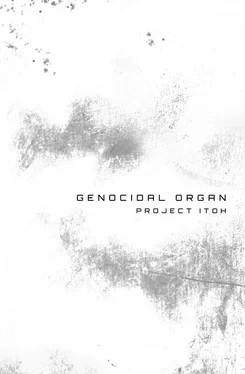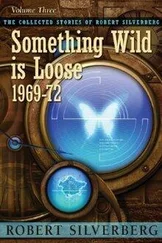Project Itoh - Genocidal Organ
Здесь есть возможность читать онлайн «Project Itoh - Genocidal Organ» весь текст электронной книги совершенно бесплатно (целиком полную версию без сокращений). В некоторых случаях можно слушать аудио, скачать через торрент в формате fb2 и присутствует краткое содержание. Год выпуска: 2012, ISBN: 2012, Издательство: Haikasoru/VIZ Media, Жанр: Старинная литература, на английском языке. Описание произведения, (предисловие) а так же отзывы посетителей доступны на портале библиотеки ЛибКат.
- Название:Genocidal Organ
- Автор:
- Издательство:Haikasoru/VIZ Media
- Жанр:
- Год:2012
- ISBN:9781421550886
- Рейтинг книги:4 / 5. Голосов: 1
-
Избранное:Добавить в избранное
- Отзывы:
-
Ваша оценка:
- 80
- 1
- 2
- 3
- 4
- 5
Genocidal Organ: краткое содержание, описание и аннотация
Предлагаем к чтению аннотацию, описание, краткое содержание или предисловие (зависит от того, что написал сам автор книги «Genocidal Organ»). Если вы не нашли необходимую информацию о книге — напишите в комментариях, мы постараемся отыскать её.
Genocidal Organ — читать онлайн бесплатно полную книгу (весь текст) целиком
Ниже представлен текст книги, разбитый по страницам. Система сохранения места последней прочитанной страницы, позволяет с удобством читать онлайн бесплатно книгу «Genocidal Organ», без необходимости каждый раз заново искать на чём Вы остановились. Поставьте закладку, и сможете в любой момент перейти на страницу, на которой закончили чтение.
Интервал:
Закладка:
“Tools for communication, of course. Or … organs, maybe, I guess?”
It was at this moment that I realized that Lucia’s language had shifted in register—slightly, subtly, but definitely. At the start of our conversation, she had been talking to me as a prospective student and customer—and that was supposed to have set the boundaries of the conversation.
But here she was now, enjoying her conversation with me.
“Organs?” I said. “You mean, as in body parts? Kidneys and bowels and arms and eyes?”
“Exactly.”
“But isn’t language a human abstraction?”
“So are you saying that abstractions can never be real? Do you believe that there’s no way the human soul could be contained in a pitiful little organ such as the brain, maybe?” Then Lucia appeared to stop herself. “Oh, forgive me if I’ve overstepped the mark. You are, perhaps, a religious man?”
I thought of Alex.
Hell is here.
Alex pointing at his own forehead.
“No, I’m an atheist,” I said.
Alex had been a religious man. He had believed in God.
And that same Alex had said that hell was inside our minds. Hidden among the folds and creases of our brains.
“That’s a relief. I know this sort of conversation can be offensive to some people.”
I laughed. “Lucky escape for you, I guess. Besides,” I pointed out, “if I were the Bible-thumping type, you would have already offended me earlier with your talk of souls and whatnot.”
“You’re right. I guess I’m the sort of person that has to rely on having lucky escapes.” Lucia laughed. “Anyway, what I was saying was that language is one of the fruits of evolution, of humanity’s natural tendency to adapt to the environment. Humans had to acquire the ability to somehow compare themselves with other things; that way they could run crude mental simulations to try and forecast the outcome of a particular action or interaction. Human thought processes—or maybe you could call it raw emotion—came up with a way of differentiating our selves from the other: the ego, they call it in psychology. After all, without having an idea of the self, you have no way of comparing yourself with the outside world, no way of making any sort of comparisons or judgment calls. But with a sense of self, man was able to avoid all sorts of danger through his ‘forecasts.’ You could say that language developed as a way of trading these ‘forecasts’ with other similar beings. This allowed us to build up a mental database of information without necessarily having to experience it firsthand, and this in turn further reduced our exposure to danger and allowed us to adapt even more perfectly to a wide variety of environments.”
“So you’re saying that language is basically just a product of evolutionary adaptation?”
“Yes. Just like our other organs.”
So the very fact that I was here now, talking to Lucia, was nothing more than an incidental byproduct of evolutionary adaptation of the brain? Was language really no more than an organ, like an elephant’s trunk or a giraffe’s neck?
Language was indeed a precise and delicate instrument, I supposed. It occurred to me that even though we now had technology such as giant artificial flesh Meatplanes and the like, we still didn’t have a way of fully replicating the complex filtration systems of human kidneys and livers on a miniature scale. Those organs were, in their own way, just as precise and delicate, as exquisite, as language. For medical science, the perfect artificial organ was still some way over the horizon. When even our internal organs still contained countless mysteries hidden to us, what right did we have to think of language as being this unique, divine gift?
I needed to know who I was. I needed to use words to communicate with other people. Surely then, language was just another inevitable evolutionary process. Language was part of my flesh. An organ called the self. An organ called language.
“If that’s the case, isn’t it a particularly human conceit, this idea that living things will necessarily develop language once they’ve evolved past a certain point?”
“You’re thinking that another species might have other ‘organs’ develop instead, you mean?” Lucia said. “So in a super-advanced civilization of crows, they’d all have incredibly sharp beaks rather than language?”
Language, and my own sense of self—both mere adaptive mechanisms. That much I got and was prepared to accept. Having said that, if language really was nothing more than an adaptive organ—well, there were examples, weren’t there, of species that became extinct through over-adaptation?
Wasn’t the saber-toothed tiger eventually driven to extinction by the weight of its own canines?
5
“Well, whaddaya know—I guess that English major came in handy after all.”
These were Williams’s first words to me to welcome me back when I returned from Lucia Sukrova’s apartment via a prearranged back route in an apartment on the opposite side of the building.
“Just the way the conversation flowed,” I said as I pulled myself out of my suit.
Williams’s eyes stayed glued to his monitor. “If you say so, dude. Sounded to me like you were quite happy to let the conversation flow that way, though, huh?”
“Not getting much at home these days, Williams?”
“Hey, buddy, I’ve still got it when I want it, you know? Ten minutes with that little lady and she’d be putty in my hands.”
“Uh-huh. What would you do, sit there and grunt at her until she submitted?”
“Nah, I’d spin some line about Eskimos and snow. Or maybe talk about Kafka.”
“I thought it was all Kafka to you?” I said.
“You don’t get it, do you? You’re allowed to leave some gaps in a conversation with a woman—hell, you’re supposed to. Gives her a chance to stick her pretty little oar in.”
“Gaps in the conversation are one thing, but in your case you’d be leaving hulking great craters. Anyway, women can’t stand self-assured pricks like you, in case you haven’t noticed.”
If I sounded like I was crossing the line from banter into something more irritable, it was because I was sometimes genuinely tired of Williams’s incessant braggadocio. Besides, he had it all wrong. You don’t try and engage a Czech language teacher by talking at them about Kafka, any more than you become buddies with a fishmonger by lecturing him about fish. If there’s one thing worse than shop talk, it’s shop talk with an amateur who thinks he knows it all. I shuddered at the memory of those godawful presentations on special ops we used to have to sit through given by slack-jawed CIA goons.
“Nice. Anyhow—any sniff of John Paul along the way?” Williams asked.
I thought back to the room. I’d kept an eye out for all the usual indicators—a ring, photographs, magazines, general cleanliness, and decor—but I had detected no obvious signs that a man had been there recently.
It turned out that the electronic sensors had had better luck than my own limited human sensory organs. A man had been in the room recently. We knew this thanks to the tiny sensor patch that I placed inside my nostril beforehand to record the airborne particles in the room. Or rather, the patch sent the data to a device stuck to my torso, the nostril-patch being merely the sensor that transmitted the data to the processor under my shirt, via the natural salts on my skin.
The smoking gun: Penhaligon Eau de Cologne.
“I guess even John Paul likes to make an effort for his lady.” Williams sneered.
The CIA had reported that no men had entered Lucia’s apartment since John Paul had left a few days ago. Only a few women, mainly bored housewives who had recently moved to Prague with their businessman husbands.
Читать дальшеИнтервал:
Закладка:
Похожие книги на «Genocidal Organ»
Представляем Вашему вниманию похожие книги на «Genocidal Organ» списком для выбора. Мы отобрали схожую по названию и смыслу литературу в надежде предоставить читателям больше вариантов отыскать новые, интересные, ещё непрочитанные произведения.
Обсуждение, отзывы о книге «Genocidal Organ» и просто собственные мнения читателей. Оставьте ваши комментарии, напишите, что Вы думаете о произведении, его смысле или главных героях. Укажите что конкретно понравилось, а что нет, и почему Вы так считаете.












